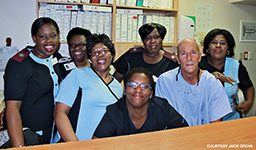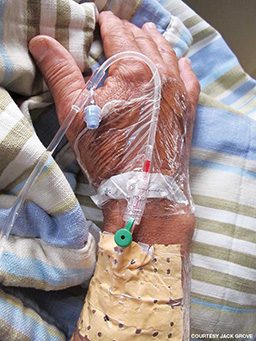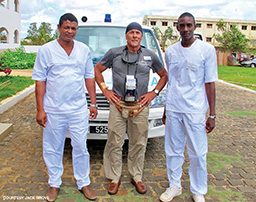As a divemaster for the past four decades, my travels have included scuba and snorkel trips to all of the world’s major oceans. Twenty-five years ago I co-founded Zegrahm Expeditions, a leader in adventure travel to the most remote islands on the planet. The goal of our work has been to help explorers fully experience the world rather than simply tour it. As part of ensuring our travelers have access to the best care, we have always required divers to carry DAN® dive accident insurance. Before my trip to Madagascar this was, to me, an abstract precaution.
Prior to an expedition across the Tropical Eastern Pacific last year, I went into the emergency room near my home in Key Largo, Fla., complaining of chest pain. They monitored me for two days but found no irregularities in my electrocardiogram (EKG) or blood work. I was released with the understanding that my problem might just be heartburn.

Before a recent expedition in the Western Indian Ocean, however, the story was different. I was diagnosed with an acute myocardial infarction — a heart attack. To say I was shocked is an understatement. The change in my diagnosis from heartburn to heart attack was confirmed when I flew to the Seychelles to board a small expedition vessel for a trip through the remote southern atolls of the Seychelles to Zanzibar and the Comoros islands. Experiencing chest pain once again, I went to the ship’s doctor, who this time discovered an irregularity in my EKG.
The doctor sent me to a clinic — a very modern one — in Antsiranana (formerly Diego Suarez), a port city at the northern tip of Madagascar. There a doctor determined the level of troponin in my blood was elevated, which confirmed my heart was in danger and that I was already having a heart attack. I had a hard time believing it because the discomfort was minimal. My expectations of what a heart attack was were upended, and it was then that I called DAN. Before family, before friends, it was the first phone call I made. At that moment I realized the value of DAN insurance.

The senior medical advisor spoke to me and asked for details about what was happening and what my needs were. He had no hesitation about suggesting evacuation. Knowing the cost that DAN would incur to cover the emergency evacuation by air ambulance from Madagascar to Johannesburg, South Africa, I was immediately and profoundly impressed.
The evacuation arranged and covered by DAN came to about $17,000. Evacuation-assistance coverage is a benefit of DAN membership, therefore I was not at any time expected to pay. To put what DAN did for me in perspective, my other medical insurance would not cover any of my medical expenses until I could produce receipts. That meant I had to use my credit card and submit the receipts when I got back to the USA. My total hospital bill, which I had to pay out of pocket, was $70,000. When I looked into what the medical services I received would have cost here in the U.S., I learned they would have been nearly half a million dollars. I feel very fortunate indeed.
Making things dicey was the fact that my primary health insurer did not cover evacuation. DAN did that immediately — with no demands on me to pay. Had my heart attack occurred while scuba diving, DAN also would have provided secondary medical coverage up to policy limits and paid 100 percent of eligible expenses.
What most impressed me about DAN was how much each person with whom I communicated truly cared about my well-being. This was the first time I have needed emergency medical assistance, and hearing the compassion as well as the professionalism in the voice of the medical specialist I first spoke to was heartwarming.

Within two days an air ambulance arrived in Madagascar. It was a private jet with two pilots and two medical professionals. The distance from Johannesburg to Antsiranana is significant, so I am grateful that I was in good hands at the clinic and that DAN got the jet to me as quickly as possible. I was transported first on the ground by ambulance from the clinic to the diminutive airport from which we took off for South Africa. We landed briefly in Mozambique to refuel and then continued for another two hours to Johannesburg. A few days later I had quadruple bypass surgery.
I am writing not simply to say thank you to Divers Alert Network for supplying incredible and timely service. I am writing to express my sincere thanks for the compassion and kindness with which I was treated throughout this ordeal. The value of human concern cannot be overstated. Five weeks passed before the airline authorities would allow me to fly back to the USA, and during that time I received numerous calls from the staff at DAN inquiring about my welfare. The people on the phone were not just calling because it was their job; the concern and humanity in their voices came through loud and clear.
Thank you, DAN. You saved my life.
© Alert Diver — Q3 Summer 2015